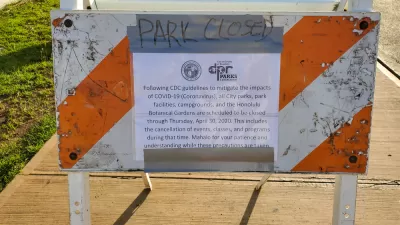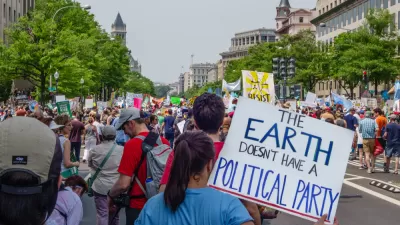This may be one of the more egalitarian parking measures proposed in any city in America: it enables the establishment of a residential parking permit district in any neighborhood in the city, requiring both residents and visitors to pay.
City Councilmember Carol Fukunaga introduced Bill 52 after a "rock fall mitigation" project eliminated many on-street parking places in her district, creating heavy demand for the remaining spaces. Key to the establishment of the "restrictive parking zone" or RPZ, as it is called in Bill 52 [PDF], is that demand must warrant it. While preferential rates are given to residents, permits can be purchased by visitors as well.
RPZs "could be created when 75 percent or more of the available on-street parking along a ten block stretch is generally occupied, or when 35 percent or more of the vehicles in that area are not owned by residents," writes Andrew Pereira of KITV4. "The city's transportation director could also make the decision to create a RPZ on his own."
(R)esidents would pay a $65 fee every two years to park on a street within six blocks of their home. A guest permit issued in in conjunction with a resident permit would cost $30. Meanwhile, non-residents would pay $25 for 60 days of parking, or anyone could pay one dollar for a single day.
"Although controversial, Fukunaga’s proposal is getting an initial nod of approval from Mayor Kirk Caldwell’s administration," writes Pereira.
"I think it's an important discussion to have with communities,” Mike Formby, the city’s transportation director, told KITV4. “It's a way for us to look at managing a demand for parking that exceeds capacity and we get complaints all the time.
In the "Road Ahead" video of an interview on "Hawaii Now" about current traffic issues, Formby is asked about the new, one-way bike lane—which the video shows to be a cycle track. Surprisingly, he explains that one of the main beneficiaries are pedestrians who had previously complained about cyclists using the sidewalks. [Of course, this is not a surprise to Planetizen readers who may have read about the pedestrian benefit on the King Street protected bike lane].
Hat tip to AASHTO Daily Transportation Update.
FULL STORY: Bill proposes parking fees for residential neighborhoods

Planetizen Federal Action Tracker
A weekly monitor of how Trump’s orders and actions are impacting planners and planning in America.

Maui's Vacation Rental Debate Turns Ugly
Verbal attacks, misinformation campaigns and fistfights plague a high-stakes debate to convert thousands of vacation rentals into long-term housing.

San Francisco Suspends Traffic Calming Amidst Record Deaths
Citing “a challenging fiscal landscape,” the city will cease the program on the heels of 42 traffic deaths, including 24 pedestrians.

Amtrak Rolls Out New Orleans to Alabama “Mardi Gras” Train
The new service will operate morning and evening departures between Mobile and New Orleans.

The Subversive Car-Free Guide to Trump's Great American Road Trip
Car-free ways to access Chicagoland’s best tourist attractions.

San Antonio and Austin are Fusing Into one Massive Megaregion
The region spanning the two central Texas cities is growing fast, posing challenges for local infrastructure and water supplies.
Urban Design for Planners 1: Software Tools
This six-course series explores essential urban design concepts using open source software and equips planners with the tools they need to participate fully in the urban design process.
Planning for Universal Design
Learn the tools for implementing Universal Design in planning regulations.
Heyer Gruel & Associates PA
JM Goldson LLC
Custer County Colorado
City of Camden Redevelopment Agency
City of Astoria
Transportation Research & Education Center (TREC) at Portland State University
Jefferson Parish Government
Camden Redevelopment Agency
City of Claremont





























